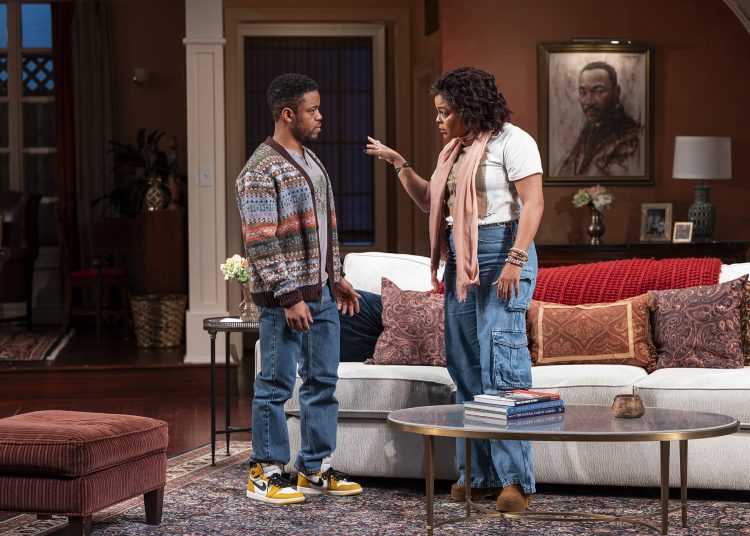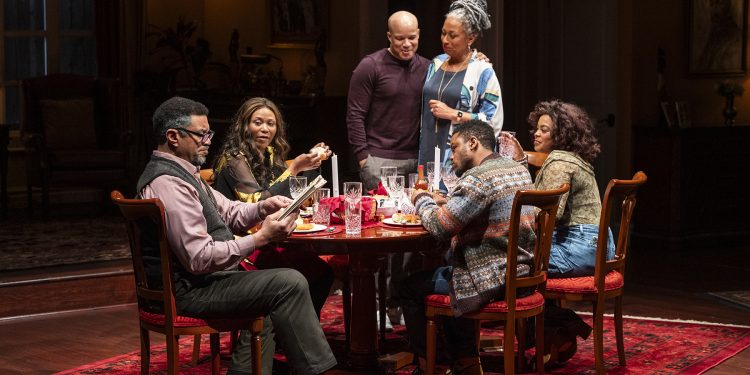By Rikki Lee Travolta The story of Steppenwolf Theatre is known far and wide among Chicago theatergoers. A small troupe of young actors started a theater company in a church basement that has gone on to be recognized as one of the premier theaters in the entire country. Its ensemble members, which include John Malkovich, Gary Sinise, and Laurie Metcalf to name just a few, are no strangers to awards and accolades. Stories of dysfunction are one of the many things that the Steppenwolf ensemble is very good at. Among the lore of the company are such monumental achievements as their groundbreaking productions of “The Grapes of Wrath” and Tracy Letts’ “August: Osage County.” I’ve had the opportunity to see some very good theatre at Steppenwolf. I have even seen some great theatre there. Now, I can say I have seen true excellence.  Greatness of a scale rarely seen, now playing through the extended date of April 28 is the best new play this city has seen in decades. “Purpose” by two-time Pulitzer Prize finalist Branden Jacobs-Jenkins is as funny as “Noises Off” and as searing as “Who’s Afraid of Virginia Woolf?”. The text dances between the two extremes with the finesse of a prima ballerina. “Purpose” has been in development at Steppenwolf for years. The end result, is truly a spectacle. “Purpose” is theater at its finest – a not to be missed event. The story is timely, set in modern, post-shutdown society. It deals with politics, religion, social norms, neurodivergence, and the web of controlling the perceptions of others. It is all wrapped up in the purpose each character is searching for. In the end, we are all searching for our purpose. The Jasper family is a powerful Black family located in the Democratic stronghold of Chicago. The patriarch of the family is civil rights leader, Rev. Solomon Jasper. He is played with the appropriate refined dignity and reverence by the great Harry Lennix – star of stage and screen. Solomon is a religious leader who has never had his own flock. He is a political leader who has never held political office.
Greatness of a scale rarely seen, now playing through the extended date of April 28 is the best new play this city has seen in decades. “Purpose” by two-time Pulitzer Prize finalist Branden Jacobs-Jenkins is as funny as “Noises Off” and as searing as “Who’s Afraid of Virginia Woolf?”. The text dances between the two extremes with the finesse of a prima ballerina. “Purpose” has been in development at Steppenwolf for years. The end result, is truly a spectacle. “Purpose” is theater at its finest – a not to be missed event. The story is timely, set in modern, post-shutdown society. It deals with politics, religion, social norms, neurodivergence, and the web of controlling the perceptions of others. It is all wrapped up in the purpose each character is searching for. In the end, we are all searching for our purpose. The Jasper family is a powerful Black family located in the Democratic stronghold of Chicago. The patriarch of the family is civil rights leader, Rev. Solomon Jasper. He is played with the appropriate refined dignity and reverence by the great Harry Lennix – star of stage and screen. Solomon is a religious leader who has never had his own flock. He is a political leader who has never held political office.  What Solomon has done, is march with Dr. Martin Luther King Jr. What he has done, is broken bread with Nelson Mandela. What he has done is achieve worldwide name recognition as a civil rights icon. Although the playwright never comes right out and says it, Solomon Jasper is a brand. That may sound familiar. It’s a pretty accurate description of the Rev. Jesse Jackson. That is no accident. Clearly, Jackson and his family served as at least a partial inspiration for the play’s central family. Solomon’s namesake eldest child achieved the political success his father dreamed of, trading on the fame of his father in order to get there. Junior, like the real-life Jesse Jackson Jr., ended up going to prison for financial crimes related to personal use of campaign funds. Also imitating the tragedies of Jesse Jackson and his family, Junior’s wife will also face legal penalties. It is a downfall that would ruin some families, but the Jasper family rests on the solid image of Solomon Sr as controlled and managed by his wife. The matriarch of the family, Claudine Jasper, is played with grace, dignity, and intelligence by Tamara Tunie in her Steppenwolf debut. Tunie is the American equivalent of theatre royalty. Among her many achievements, Tunie played Maggie in the first all African American production of “Cat on a Hot Tin Roof.” She is also recognized for her tenure on television’s “Law & Order: SVU”.
What Solomon has done, is march with Dr. Martin Luther King Jr. What he has done, is broken bread with Nelson Mandela. What he has done is achieve worldwide name recognition as a civil rights icon. Although the playwright never comes right out and says it, Solomon Jasper is a brand. That may sound familiar. It’s a pretty accurate description of the Rev. Jesse Jackson. That is no accident. Clearly, Jackson and his family served as at least a partial inspiration for the play’s central family. Solomon’s namesake eldest child achieved the political success his father dreamed of, trading on the fame of his father in order to get there. Junior, like the real-life Jesse Jackson Jr., ended up going to prison for financial crimes related to personal use of campaign funds. Also imitating the tragedies of Jesse Jackson and his family, Junior’s wife will also face legal penalties. It is a downfall that would ruin some families, but the Jasper family rests on the solid image of Solomon Sr as controlled and managed by his wife. The matriarch of the family, Claudine Jasper, is played with grace, dignity, and intelligence by Tamara Tunie in her Steppenwolf debut. Tunie is the American equivalent of theatre royalty. Among her many achievements, Tunie played Maggie in the first all African American production of “Cat on a Hot Tin Roof.” She is also recognized for her tenure on television’s “Law & Order: SVU”.  Claudine is the picture of poise. She is not just the spokesmodel for the Solomon Jasper brand, she is the mastermind of how each and every member of the family is to be perceived. It is not surprising that Claudine has a background in law. She has a certain Hillary Clinton quality in that she is a strong woman married to a powerful man, who we learn exerts a healthy control over that power. She has that rare ability to smile even while saying non-smiling words. The play takes place over a few snowed-in days at the Jasper estate. On hand are Solomon, Claudine, their sons Junior and Naz, Junior’s wife Morgan, and Naz’s friend Aziza. Much to Claudine’s disappointment, her grandchildren have not made the trip. Junior has just been released from prison for his financial crimes. In a few days, his wife Morgan will be going to prison to serve a sentence for her involvement. Younger brother Naz has returned to his parent’s home from his job shooting nature photography in the Canadian wilderness. His former neighbor from New York, Aziza, drove him to Chicago for the visit. The two share a secret relating to what Aziza sees as her purpose coming out of the pandemic.
Claudine is the picture of poise. She is not just the spokesmodel for the Solomon Jasper brand, she is the mastermind of how each and every member of the family is to be perceived. It is not surprising that Claudine has a background in law. She has a certain Hillary Clinton quality in that she is a strong woman married to a powerful man, who we learn exerts a healthy control over that power. She has that rare ability to smile even while saying non-smiling words. The play takes place over a few snowed-in days at the Jasper estate. On hand are Solomon, Claudine, their sons Junior and Naz, Junior’s wife Morgan, and Naz’s friend Aziza. Much to Claudine’s disappointment, her grandchildren have not made the trip. Junior has just been released from prison for his financial crimes. In a few days, his wife Morgan will be going to prison to serve a sentence for her involvement. Younger brother Naz has returned to his parent’s home from his job shooting nature photography in the Canadian wilderness. His former neighbor from New York, Aziza, drove him to Chicago for the visit. The two share a secret relating to what Aziza sees as her purpose coming out of the pandemic.  Beneath the surface, there are many landmines present in the Jasper household. Junior’s wife Morgan is none too pleased to be going to prison for her husband’s wrongdoings. Claudine and Solomon are none too accepting of Naz and Aziza’s alternative lifestyles. Naz is also the narrator of the story, stepping in and out of the action to address the audience directly. Jon Michael Hill, who plays Naz, is brilliant. His characterization is natural, real, and 100% authentic. He is a misunderstood young man – misunderstood by his family, his friends, and society in general. He is one who would prefer, for the most part, to be left alone. Steppenwolf artistic director Glenn Davis plays older brother Solomon Jr. He instills in the disgraced politician an urban feel that is not present in the other members of the family. Educated by his parents in the art of appearances, Junior is all about trading on the strengths of his family to make his mark in the world. Alana Arenas is spectacular as Junior’s wife Morgan. She has had her fill of taking care of Junior and being controlled by his parents. The Jaspers have made clear that family comes before everything else, and although related by marriage, Morgan is not a blood relative. Arenas provides an outburst in Act I that is truly masterful, her somber realizations in Act II are equally as moving. Ayanna Bria Bakari as Naz’s friend Aziza is filled with bubbly energy. Naz had not previously shared that he comes from a well-known family. When Aziza discovers she has stumbled into the home of one of the great civil rights leaders in history, she goes a bit fan girl. It is cute and fun, although Bakar shows later that she is just as capable of the dramatic demands of the role.
Beneath the surface, there are many landmines present in the Jasper household. Junior’s wife Morgan is none too pleased to be going to prison for her husband’s wrongdoings. Claudine and Solomon are none too accepting of Naz and Aziza’s alternative lifestyles. Naz is also the narrator of the story, stepping in and out of the action to address the audience directly. Jon Michael Hill, who plays Naz, is brilliant. His characterization is natural, real, and 100% authentic. He is a misunderstood young man – misunderstood by his family, his friends, and society in general. He is one who would prefer, for the most part, to be left alone. Steppenwolf artistic director Glenn Davis plays older brother Solomon Jr. He instills in the disgraced politician an urban feel that is not present in the other members of the family. Educated by his parents in the art of appearances, Junior is all about trading on the strengths of his family to make his mark in the world. Alana Arenas is spectacular as Junior’s wife Morgan. She has had her fill of taking care of Junior and being controlled by his parents. The Jaspers have made clear that family comes before everything else, and although related by marriage, Morgan is not a blood relative. Arenas provides an outburst in Act I that is truly masterful, her somber realizations in Act II are equally as moving. Ayanna Bria Bakari as Naz’s friend Aziza is filled with bubbly energy. Naz had not previously shared that he comes from a well-known family. When Aziza discovers she has stumbled into the home of one of the great civil rights leaders in history, she goes a bit fan girl. It is cute and fun, although Bakar shows later that she is just as capable of the dramatic demands of the role.  “Purpose” is directed by two-time Tony winner Phylicia Rashad. Rashad has deftly orchestrated a group of amazing actors so that each one gets their opportunity to shine individually, while jointly presenting a play that excels as both a comedy and a drama. The details provided by scenic designer Todd Rosenthal are simply exquisite. The palatial home of the Jasper family could easily fit in one of Chicago’s more affluent suburbs. Costume design is by Dede Ayite, and done with excellence. Sound design is handled by Rob Milburn and Michael Bodeen. The lighting design by Amith Chandrashaker adds significantly to the storytelling. The lights are a partner to Naz as he steps in and out of the action of the play. The creative staff also includes associate director Tyrone Phillips, fight choreographer Matt Hawkins, vocal coach Kate DeVore, and dramaturg Jonathan L. Green. The creative producer is Patrick Zakem and the producing director is Tom Pearl. JC Clementz earns high praise for casting. Laura D. Glenn is the production stage manager, assisted by Jaclynn Joslin.
“Purpose” is directed by two-time Tony winner Phylicia Rashad. Rashad has deftly orchestrated a group of amazing actors so that each one gets their opportunity to shine individually, while jointly presenting a play that excels as both a comedy and a drama. The details provided by scenic designer Todd Rosenthal are simply exquisite. The palatial home of the Jasper family could easily fit in one of Chicago’s more affluent suburbs. Costume design is by Dede Ayite, and done with excellence. Sound design is handled by Rob Milburn and Michael Bodeen. The lighting design by Amith Chandrashaker adds significantly to the storytelling. The lights are a partner to Naz as he steps in and out of the action of the play. The creative staff also includes associate director Tyrone Phillips, fight choreographer Matt Hawkins, vocal coach Kate DeVore, and dramaturg Jonathan L. Green. The creative producer is Patrick Zakem and the producing director is Tom Pearl. JC Clementz earns high praise for casting. Laura D. Glenn is the production stage manager, assisted by Jaclynn Joslin.  Understudies include Kayla Forde (u/s Aziza), Jabari Khaliq (u/s Naz), Shadana Patterson (u/s Morgan), Penelope Walker (u/s Claudine), Johnard Washington (u/s Junior), and Cedric Young (u/s Solomon). “Purpose” is a play about maintaining appearances, and what the truth is that bubbles under the surface. It is a play about finding one’s place in the world and understanding the obligations of family and where those obligations end and one’s own personal priorities take over. Steppenwolf’s “Purpose” is a powerful play that will make you feel and make you think. Yet, it is also wickedly funny. I honestly have not laughed so hard in years. “Purpose” runs through April 28, 2024 in Steppenwolf’s Downstairs Theater, 1650 N. Halstead Street in Chicago. For tickets visit www.Steppenwolf.org or call the box office at (312) 335-1650.
Understudies include Kayla Forde (u/s Aziza), Jabari Khaliq (u/s Naz), Shadana Patterson (u/s Morgan), Penelope Walker (u/s Claudine), Johnard Washington (u/s Junior), and Cedric Young (u/s Solomon). “Purpose” is a play about maintaining appearances, and what the truth is that bubbles under the surface. It is a play about finding one’s place in the world and understanding the obligations of family and where those obligations end and one’s own personal priorities take over. Steppenwolf’s “Purpose” is a powerful play that will make you feel and make you think. Yet, it is also wickedly funny. I honestly have not laughed so hard in years. “Purpose” runs through April 28, 2024 in Steppenwolf’s Downstairs Theater, 1650 N. Halstead Street in Chicago. For tickets visit www.Steppenwolf.org or call the box office at (312) 335-1650.
Photo credit: Michael Brosilow
For more reviews visit: Theatre in Chicago – your source for What’s on Stage in the Chicago Area.





